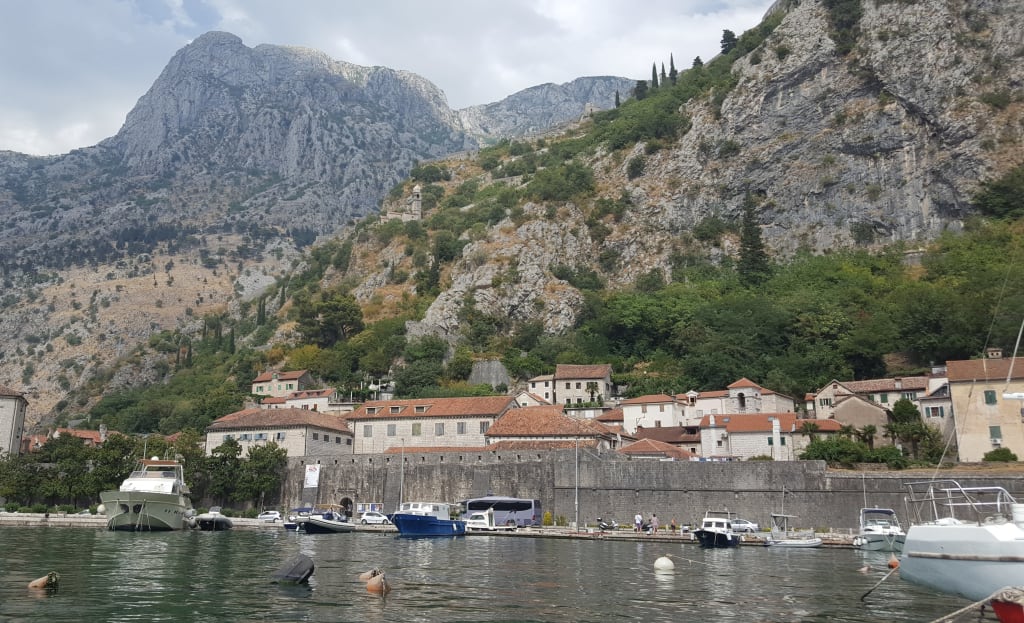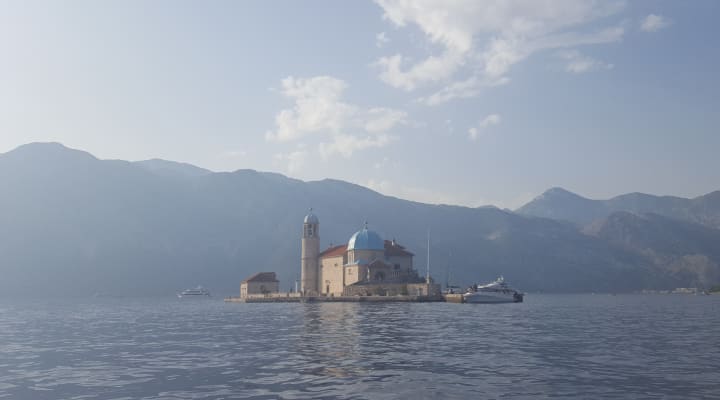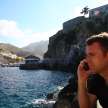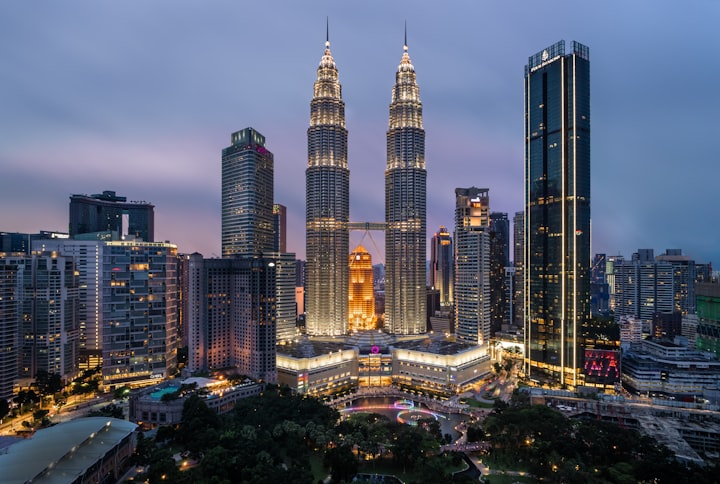Fascinada
Minute by minute, life passes us by.

His father built this boat. With tools worn by time and help from his uncle, he bent the planks around the frame and hammered them into place and sealed the joints with hot pitch, while the summer light bent and warped in the haze of heat that rose from the metal can. Every year afterwards, in July heat, he rowed the boat from the village to the island to heave rocks into the bay and keep the church afloat.
This year, the old man is too sick to row out to the church. Too sick even to ride in the bow over the sleek skin of the sea and watch his son pull back on the oars. This year, the son will go alone and heave rocks into a bay filled with rocks to honour a God he barely believes in.
*
On the day of the Fascinada, I was riding in a speedboat across Boka Bay. My skin, tanned and discolored already from a bright Italian winter, crackled under the assault of Montenegrin sun and salt. The bus we had taken from Dubrovnik to Kotor had been held up for hours at the border, and we had missed the tour we had booked. We found another and coughed up our money, assured by the guide that we’d make it back to the dock with plenty of time to catch the bus back to Croatia. It was a truncated visit to Montenegro already, made even shorter by the long wait at the border.
And as the rowboats began to congregate in the ancient harbour of Perast, decked out in flags in honour of the sacred occasion, we were bouncing across the bay with the thrum of the engine loud in our ears, anxiously watching the clock as the minutes ticked by. We couldn’t spend a night in Kotor. The trip was already costing us more than we could afford. We had to make it to our bus, the final bus to leave that day. And the departure time crept closer and closer. This is how, incidentally, life gets lost to us. Minute by minute, while we’re looking elsewhere.
*
In Capri, they charge you 12 Euros to lie flat in a musty rowboat and be hauled into the Blue Grotto. It’s a tourist trap, no question of that. But it manages to be just about worth it still. Lit by the sun outside, the water in the dripping cave is an unearthly, unreal blue, as though reality has been Photoshopped by a happy quirk of geology and physics. Romans made this place a shrine, and it’s easy to see why even today, as the tour boats follow each other around the walls and the owners belt out Sole Mio for tips while cameras flash and chime. The water is startlingly clear, making it seem far more shallow than it actually is, and you want to dive into it the way a bird seeks the open sky, its throat swelling with song. But you’re not supposed to. The emperor Tiberius used to swim here, along with his retinue of boys. But you’re no emperor, and it’s not for you.
Of course, people do swim there. They come at night when the tours aren’t running and climb down the steep steps carved into the cliff outside, their towels rolled in their hands. But swimming at night makes me uneasy. And the waters around Capri, made inviting by iridescent colour and clarity, are chilly in March. For our first six months in Italy, the winter months, we never swam.

“Look!”
From the deck of the bobbing boat, the skipper held out his phone to show the image of the two of us glowing on the screen. Floating in the water, our bodies were perfectly visible from head to toe, skin turned a bright, almost neon blue by the water’s weird effect. “Like Smurf!” he cried, as though delighted by a phenomenon he must have seen hundreds of times before. “Like Papa Smurf!”
The blue caves of Kotor don’t have the same restrictions as the one on Capri. They don’t have the same tourist pressures, either. This small country, younger than my brother’s daughter, can’t afford to be as strict with its tourists as Italy can. The chance to leap into the Gatorade-coloured water we had seen in Italy was a big part of the reason we had wanted to take a boat trip in Montenegro. The water in the cave at Kotor, our leather-skinned skipper told us in charmingly inaccurate English, is eight meters deep. But it’s so clear that you kick your legs carefully as you tread water, certain that your feet will scrape the rocky bottom. It’s a disorientating feeling, floating in the middle of the bright blue nothingness, held up by the taste of salt in your throat.
*
Five hundred and sixty-five years to the day before we swam in the blue cave, two brothers—they weren’t Montenegrin, because there was no Montenegro then—went fishing in the bright blue bay that sustained their village. One of the brothers had been sick a long time, his face grown gaunt and angular, his rough fingers trembling as he stared out to sea. But rowing and hauling traps up from the clear depths is work for two men, not one, and so they set out together.
In the bay they had known their whole lives, they found something new. A pile of rocks, rising out of the ocean, bearing an icon of the Madonna and child. I imagine the brothers falling to their knees as the pellucid waves lapped against the tight planks of the boat they built by hand, overcome that God should reveal himself to them. And when the sick man began to get better after this minor miracle, the brothers could hardly have been surprised. Miracles tend to follow one another.
When fishermen from Perast returned safe from the sea, they would drop a rock into the bay where the icon appeared, to give thanks. A pile became a mound, and a mound became a hill, and in the bay, an island formed. The church built on the island founded on fishermen’s thanks is still there today.

The church was the last stop on our tour of the bay, and the one that interested us least. Forest fires blazed on the surrounding mountains, and the bus we had to catch might already be in the station, and we stared across the water as though we could make the harbour come closer through force of will alone. While the other members of our tour explored the small church, we stayed close to the boat, eager to leave.
Jacinta Kunic-Mijovic spent twenty-five years waiting for her husband to return from the sea that took him from her. While she waited, she sewed a tapestry for the church. She sewed for twenty-five years until she lost her sight. She threaded her own hair into the tapestry, using it to make the hair of the angels she embroidered, and if you look closely, you can see her hair turn from brown to white as the years passed, and her husband stayed lost.
It’s possible that none of this actually happened. That doesn’t mean it’s not true.
*
I don’t go in much for social media, despite being right in the middle of the curve of their demographics. But none of that makes me immune to the modern sickness. The constant wondering what’s next, the inability to ever truly experience the present moment. As the waves splashed against the fiberglass hull of our boat, the mountains beginning to glow as the sun sank over the water, I was thinking about ways to boost my sales. I don’t spend too much time in the past - not my own, anyway. I visit when I have to; I can’t stand the smell in those places. The future is my poison. It’s always tomorrow for me, or next week, or next year. Even though life has repeatedly taught me otherwise, I struggle to free myself of the feeling that if I only think hard enough, I’ll come up with a plan so perfect that every moment of my life will become poetry. But of course, when the future arrives, it comes in the guise of the present, and so you’re never really in it, either. The horizon moves as you approach it, and you may as well chase your own tail. Life becomes poetry the minute you live it fully, in the only time that will ever be available to you: right now.
*
We made it to our bus, in the end. We stumbled panting into the station with sweat running down our faces just as the battered old coach swung into the parking lot. The same bus, with the same weary driver and harried conductor that had carried us out of Dubrovnik at seven that morning. Relieved and dripping, we boarded, and the bus pulled out of Kotor just as the first boats rowed out of the harbour at Perast in continuation of a tradition older than Columbus’ voyage. It was midnight before we made it back to the hotel bed we had left at five that morning, and by then the boats in Perast had dropped their rocks and headed home. The long-dead brother’s promise to their God, kept on their behalf for half a millennium. Some people find a sense of timelessness in religion, the time-worn rites aimed at honouring or appeasing this or that personified abstraction. Some find it in motion, in breathless exertion, on the track or on the sporting field. Some find it in family. Nabokov insisted it could be found in a meadow full of butterflies.
But for me, lazy agnostic and nomadic hack, the best way I know to cut through the constant chatter of passing time and be in the eternal moment is this, hunched over a piece of paper with a pen in my grip. Everything else, be it majesty or terror, withers and shrinks the moment I reach out my hand.
About the Creator
Ryan Frawley
Towers, Temples, Palaces: Essays From Europe out now!
Novelist, entomologist and cat owner. Ryan Frawley is the author of many articles and stories and one novel, Scar, available from online bookstores everywhere.






Comments
There are no comments for this story
Be the first to respond and start the conversation.